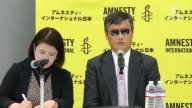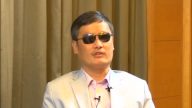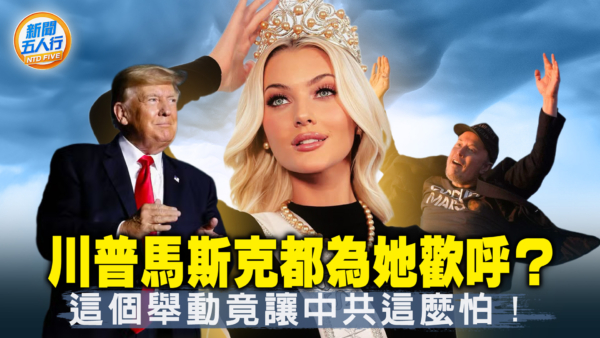【新唐人2012年5月2日讯】维权律师陈光诚逃脱软禁,进入北京美国使馆,再次把中美双方牵在一起。虽然美国总统奥巴马和国务卿希拉里都对此事不予评论,但外界认为,这又是一场中美关系的考验。也有学者指出,中美双方已经无法分开,美国已经无法避免“介入中国”。
“陈光诚事件”发生时,正好是美国国务卿希拉里带队访问北京,举行例行战略对话前的敏感时刻。
在启程前往中国前,希拉里表示,会与中方官员讨论包括人权在内的所有议题,但她拒绝评论“陈光诚事件”。
30号,美国总统奥巴马被记者问到“陈光诚事件”时,回答说,“不会就此问题发表声明”。
不过,美国“哥伦比亚广播公司”声称,专责东亚事务的助理国务卿坎贝尔,目前在北京正与中方官员进行紧密谈判,希望在美中双方正式举行的“战略与经济对话”前,将“陈光诚事件”解决。
中国问题专家文昭认为,现在对奥巴马政府是个非常大的考验,他面临着国会、人权团体、在野党等多方面的压力。
文昭:“奥巴马走一个很艰难的平衡,既要维护美国对人权的承诺,同时他又想维持一种和中共关系的平衡。因为美国在很多当前问题上需要得到中共的支持,比方说在叙利亚问题上、在制裁伊朗和朝鲜的核问题上,还有双方经贸、军事互信、汇率问题,这些很多问题他还需要北京的合作。”
时事评论家陈破空指出,二战期间美中就是盟国关系,美国对中国帮助极大。虽然中共上台后把美国当成敌人,但中国老百姓和官员从不把美国当成敌人,现在不仅像陈光诚这样的普通民众有事找美国,连王立军这样的高官也要求助美国,中国人民是需要美国的。
陈破空:“中美关系比一般盟国的关系深刻和复杂,我们看到美国尽可能避免卷入、介入中国内政,而中共政府也再三声称不要美国干涉中国内政。但是事实上,中国人民非常需要美国介入,在中国的发展进程中,美国的决策是不可或缺的。所以美国无法避免它对中国的角色。”
“对华援助协会”负责人傅希秋对《新唐人》表示,目前中美双方都在以积极的态度解决“陈光诚事件”,傅希秋透露,他们已经向美国行政当局施加压力,不能因为中共的任何承诺而把陈光诚交给他们。希望可能的结果是,让陈光诚全家以就医的方式来美国。
“对华援助协会”负责人傅希秋:“就是说以人道主义的理由来美国,来申请医疗性的帮助,就是双方都有面子,都过去了。”
陈光诚在4月27号通过网路视频,向温家宝提出三点要求,其中一点他要求温家宝回答,“这一切不法的行为究竟是地方党委干部违法乱纪胡作非为,还是受中央指使的。”
对此,文昭指出,围堵陈光诚一年费用要几千万,外交上,中共拒签美议员探访陈光诚的签证,并且在陈光诚出逃后的全国范围大搜捕,这些很难是山东省能做得了的。但这暴露出的政法委问题,对加速处理薄熙来、周永康却是有利的。
文昭:“目前周永康的处境肯定是非常焦头烂额的,因为陈光诚这个事情,从体制内来讲,显示它的所谓维稳系统存在巨大的漏洞,它占用了国家大量的经费,编织了一个庞大的维稳网络,但是让陈光诚,一个盲人一出逃就捅破了。”
陈破空也认为,王立军、薄熙来案件、加上陈光诚事件,给中国政治转型和社会的良性发展,提供了一个千载难逢的机会,抓住这个机会的人,就是名垂史册的人。如果中共还是在独裁专制的黑道上一意孤行的话,那只能在“普世价值”这个车轮面前粉身碎骨。
采访/梁欣 编辑/宋风 后制/孙宁
************************
Chen Guangcheng Case Tightens Sino-U.S. Relations Again
Chen Guangcheng, China’s rights activist, entered Beijing’s
U.S. Embassy after escaping house arrest.
The event, once again, links China with the U.S.—causing
what analysts say is a new test for the Sino-US relations—
but both U.S. President Obama and Secretary of State,
Hillary Clinton, remain silent on the issue.
Scholars note that China and the U.S. cannot be separated,
with no way for the U.S. to avoid “getting involved in China”.
Chen Guangcheng escaped to freedom at a sensitive time—
on the eve of the US-China strategic and economic dialogue.
U.S. Secretary of State Hillary Clinton was reported to lead
the delegation attending the meeting.
Before leaving for China, Clinton said, all issues including
human rights will be discussed with the CCP officials.
Yet Clinton refused to comment on the Guangcheng event,
as did U.S. President Obama, who said at a press interview
on April 30:“I’m not going to make a statement on the issue.”
The CBS says Kurt Cambell, Assistant Secretary of State
for East Asian & Pacific Affairs, is holding close negotiations
with CCP officials in Beijing—both sides hoping to resolve
the Guangcheng case before the formal dialogue opening.
Wen Zhao, an expert on China issues, says current events
pose a big test for the Obama administration, who are now
facing pressure from all sides—from the Congress, from
human rights groups, and from opposition parties.
Wen Zhao: “It’s a very tough balancing act for Obama, who,
besides meeting US commitments on human rights, wants to
strike a balance in his relations with the CCP, as the U.S.
needs to get the nod from the CCP on many current issues.”
Obama seeks cooperation from Beijing on issues such as:
Syria; sanctions against nuclear power in Iran and N.Korea;
bilateral economy and trade; mutual military trust; and
exchange rate issues.”
Critic Chen Pokong points out that during World War II,
the U.S. offered great help to China, as its ally.
The CCP regime has long treated the U.S. as its enemy,
but its officials and the Chinese people have never done so.
Now it’s not only ordinary people like Chen Guangcheng
who seek help from the U.S.,
but also senior officials, like Wang Lijun—
Chen says Chinese people need the U.S.
Chen Po Kong: Sino-US relations are more profound and
complex than that between other allies.
“We have seen that the U.S. has tried its utmost to avoid
getting involved in China’s internal affairs,
and the CCP regime has repeatedly claimed that the U.S.
must not interfere with China’s internal affairs.”
“But Chinese people need the U.S. involvement, because
decisions made by the U.S. are indispensible for China’s
development—the U.S. can’t avoid playing a role in China."
Bob Fu, President of China Aid Association, told NTD that
the two sides are proactively solving the Guangcheng case.
Bob Fu says the CCP have exerted pressure on the U.S.—
no matter what the CCP promises, the U.S. should not
return Chen Guangcheng to the regime.
The best result, according to Fu, is for Chen Guangcheng
and his family to reach the U.S. under the pretext of’seeking medical treatment’.
Bob Fu: “That is, seek U.S. medical aid under humanitarian
reasons, so both sides will be graceful and let things pass."
On his video statement on April 27, Chen Guangcheng
put forward 3 requirements to Premier Wen Jiabao.
Chen Guangcheng asked Wen Jiabao:
“For all these illegal acts, were they lawless misconducts
committed by local Party cadres, or were they incited by
the central authorities?"
Wen Zhao says the CCP’s annual expenditure on controlling
Chen Guangcheng is tens of millions of RMB.
The CCP tactfully denied a visa to a U.S. Congressman
for visiting Chen Guangcheng, and after Chen’s escape,
a nationwide hunt was launched to find him.
All these acts could hardly be contributed to the local
authorities of Shangdong Province.
However, the Chen Guangcheng case uncovered problems
with the Political and Legal Affairs Committee.
Its exposure will help speed up the move against Bo Xilai
and Zhou Yongkang, says Wen Zhao.
Wen Zhao: “At this moment, Zhou Yongkang has certainly
gotten burnt—Chen Guangcheng’s escape shows
a huge loophole with the system of “stability preservation”,
which has cost vast amounts of money.
This system weaved an extensive network but the escape of
Chen Guangcheng, a blind man, crushed it.”
Chen Pokong says the outbreak of Wang Lijun incident,
the case of Bo Xilai, plus the Chen Guangcheng event,
offered a very rare historic opportunity for China’s
political transformation and healthy social development.
Chen Pokong believes that, whoever seizes the opportunity
will be the person making history.
If the CCP remains defiant in taking the path of dictatorship,
the regime will simply be smashed by “universal values".





















